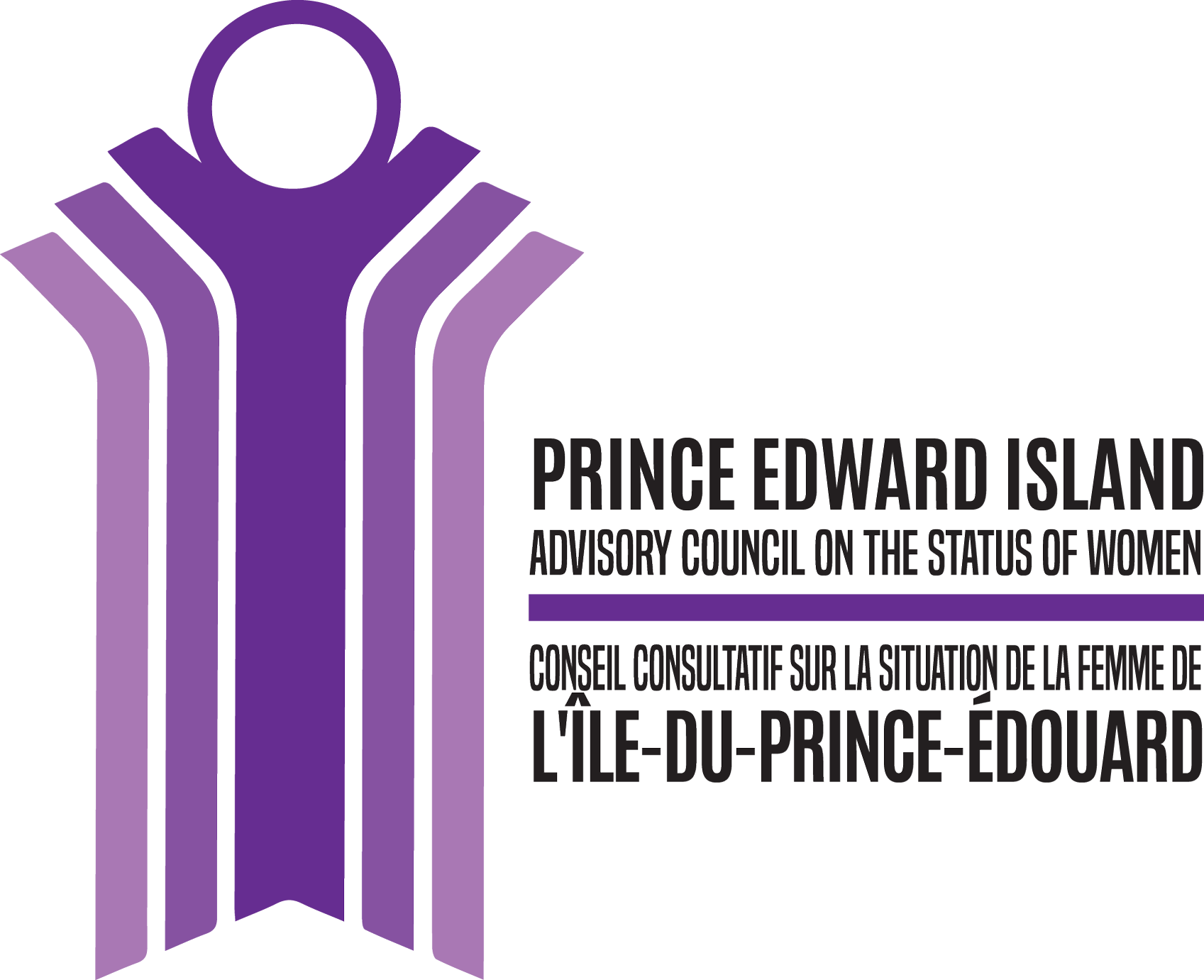Input on Proposed Changes to the Residential Tenancy Act
PEI Advisory Council on the Status of Women
March 31, 2020
The Prince Edward Island Advisory Council on the Status of Women (PEIACSW) is a nine-member, government-appointed arms-length government agency with a legislated mandate to advise the Prince Edward Island government and educate the public on matters that affect to the status of Prince Edward Island women.
Housing as a Human Rights Issue and a Gender Issue
Housing is certainly a matter that affects Prince Edward Island women. Housing is a human right, as outlined in the United Nations Universal Declaration of Human Rights, Article 25 (1):
Everyone has the right to a standard of living adequate for the health and well-being of [them]self and of [their] family, including food, clothing, housing and medical care and necessary social services, and the right to security in the event of unemployment, sickness, disability, widowhood, old age or other lack of livelihood in circumstances beyond his control.
The PEI Advisory Council on the Status of Women advocates for housing that is
- Affordable: including public, social, and cooperative housing, or subsidized or otherwise financially supported through repair, energy efficiency, or other programs.
- Accessible: meaning physically accessible to people with disabilities or who use mobility supports; or built to universal design standards; and accessible to and from public services.
- Appropriate: meaning a suitable place to live for the household housed there, but also meaning appropriate to the wishes and needs of the householder – in particular, institutional housing is not appropriate for a person with intellectual challenges who wishes to live in a house, and seniors’ housing is not appropriate for a young person with mobility challenges.
- Safe: meaning habitable and safe from causing injury, but also meaning safe and secure from violence, crime, and threats of violence and crime – a safe home includes appropriate lighting, visible entries and exits, lockable doors and windows, and other similar features.
Access to affordable, accessible, appropriate, and safe housing is a gender issue. Women make up a portion of landlords and of tenants, but Statistics Canada has shown clearly that “Lone mothers and senior women are the least likely groups to live in a home owned by a household member.” In other words, these groups, who are also susceptible to low income, are most likely to be renters.
The situation for lone mothers is particularly notable. Statistics Canada reports: “Sizeable gender differences in the likelihood of home ownership can be observed among lone parents: 38.2% of lone mothers lived in a house owned by oneself or a household member, compared with 62.0% of lone fathers.” And, “Lone mothers and lone fathers tended to be the least likely groups to have affordable (62.6% and 75.7%, respectively), adequate (91.4% and 92.4%, respectively), and suitable (78.2% and 79.5%, respectively) housing.” Statistical analysis concluded, “Lone mothers and unattached women were less likely than their male counterparts to be able to afford their housing.” (See Women in Canada: A Gender-based Statistical Report. “The Economic Well-Being of Women in Canada,” by Dan Fox and Melissa Moyser, May 16, 2018, https://www150.statcan.gc.ca/n1/pub/89-503-x/2015001/article/54930-eng.htm.)
Additionally, we acknowledge an inherent power imbalance between landlords (owners of housing they do not need to or choose to live in) and tenants (people who need to or choose to rent to access their human right to housing). As a result of these factors, the PEI Advisory Council on the Status of Women’s analysis of proposed changes to the Residential Tenancy Act generally privileges renters’ rights over landlords’ interests, while acknowledging that it is in the interests of renters, tenants, and all of Prince Edward Island to enable good relationships between tenants and landlords, based on principles of fairness and justice.
Given that housing is a human right, the goal of the Residential Tenancy Act should be to foster positive reciprocal relationships. Strong relationships help support availability of affordable, accessible, appropriate, and safe housing for all.
The Current Context
In recent years, Prince Edward Island and especially Charlottetown has found itself in the midst of a housing crisis characterized by low vacancy rates, housing supply scooped out by short-term rentals, renovictions, and a large proportion of some groups paying a high proportion of their income for housing (in core housing need by CMHC definitions). This leads to a critical lack of affordable housing. The housing crisis is made more severe by lack of Island-wide public transit, with essentially no transit options in rural regions, limited public transit routes and schedules in Charlottetown/Stratford/Cornwall, and no public transit in Summerside. These factors put a thumb on the scales in favour of landlords over tenants.
Revisiting the Residential Tenancy Act in this context is essential, and we commend government for updating this act.
It is also important to acknowledge that in the midst of the COVID-19 crisis, all Islanders are being asked by public health officials to stay at home, in whatever housing they have, for all but essential services. Recent travellers are being asked to self-isolate and not leave their housing except its yard for fourteen days.
Never has the importance of affordable, accessible, appropriate, and safe housing been more evident in people’s lives. Thousands of Canadians are facing a sudden loss of income and are unsure how they will pay April 1st rent or mortgage payments. The federal, provincial, and municipal governments are announcing supports for residents daily. These include supports for housing and must equitably include supports for both landlords (such as mortgage payment deferrals) and, urgently, for renters (such as rent supplements and a moratorium on all evictions for the period of the public health emergency). The Council urges the provincial government to continue its efforts to support Island residents through the coming months.
The precarity of living in rented housing is very clear. People experiencing homelessness are incredibly vulnerable in this global pandemic. We worry for their well-being. We recognize that there are not equal services and supports for homeless women as there are for homeless men in Prince Edward Island, with more funding available for Bedford MacDonald House emergency shelter for men than for Blooming House emergency shelter for women.
The Residential Tenancy Act can only be considered just and fair to the degree that it helps prevent homelessness.
The Act must uphold those people in our society who are made vulnerable by poverty, discrimination, ill-health, disability, trauma, or other injustices. The Council acknowledges that some renters may subtly or even covertly be discriminated against on the basis of marital or family status (having children), gender and sexuality, immigration status, age, appearance, or even companion animals.
Comments on Proposed Changes to the Residential Properties Act
Director of Residential Tenancy: The new powers proposed for the Director of Residential Tenancy seem appropriate. It is especially important that the Director will have “new powers to mediate a settlement in certain circumstances.” As in all cases of mediation, it will be important to ensure mediation is an appropriate tool for dispute resolution between parties. When it is appropriate, mediation is the best way to achieve positive results and positive relationships. When it is not appropriate, it is dangerous. The Director should be required to screen for power imbalances and for violence or discrimination to ensure mediation is appropriate in any given case.
With new powers for the Director of Residential Tenancy comes more work. It will be important to ensure there are adequate resources in the Director’s office to support this work.
Communications from the Director of Residential Tenancy’s office will set the tone for how changes to the Residential Tenancy Act are received. Council members perceive that the current, unupdated Act is seen as overbalanced towards landlords’ interests. With an updated and better balanced Act, there will be communications work to do to build trust among tenants that the Act also protects their rights.
Security Deposits and Fees: The proposed new process regarding security deposits and fees seems reasonable. It is particularly valuable that there will be clear documentation of pre-move-in and post-move-out inspections. It should be noted that inspection reports should be designed to be understandable for people with low literacy in English or French, and visual reports focused on images rather than text should be permissible – or even encouraged.
The requirement for the landlord to apply to keep a security deposit is a good provision, and the list of items a landlord can charge fees for is clear.
Rent Increases: The power to apply rent controls is extremely important to preserving tenants’ rights. The proposed new rules around rent increases are important, especially tying maximum annual rent increases to the Consumer Price Index. It is important to Council members that rent increases be tied also to consistent and regular maintenance of buildings and properties so that rents don’t continue to increase annually on properties that deterioriate annually. It is helpful that the Act outlines and limits the factors that could allow for a rent increase above the guidelines.
Late Rent: We have some concerns about the proposed shorter time lines for evictions if a tenant does not pay rent. It is reasonable that a landlord can give an eviction notice the day after rent is late; however, seven (7) days may not be sufficient time for a tenant to pay the rent or challenge the eviction. Tenants who gain income from work are likely to be paid bi-weekly, and a period of fourteen (14) days to pay rent or challenge an eviction would be more likely to include a payday. A fourteen-day period would more appropriately align with pay schedules.
Property Abandonment: The proposed new process for dealing with property abandoned in a rental property seems reasonable.
Renovictions: The recent spate of renovictions, particularly in Charlottetown, has been tremendously hard on women and families and particularly those who live in low income. Council members all know family, neighbours, and friends whose lives were thrown into chaos by landlords evicting them to make renovations. Too often the renovations have been too minor to justify eviction, were a pretext for shifting long-term rentals to short-term rentals, or were intended to justify dramatic rent increases.
- New stipulations that renovations must be significant enough to require a building permit and an empty unit are good.
- New timelines to give a tenant six months’ notice of upcoming evictions for renovations are good.
- New penalties for wrongful eviction of tenants are good.
- Allowing tenants the right of first refusal on freshly renovated units when renovations are complete is good.
- Allowing tenants to claim compensation for a renovation eviction from a property with more than twenty units is reasonable. It would be valuable to consider other circumstances where compensation would be reasonable when there is a renovation eviction from properties with fewer units; twenty units seems like an arbitrary number – and a high number.
Families with School-Aged Children: Especially in combination with new guidelines for renovictions, the proposal to prevent evictions of families with school-aged children during the school year is excellent. Not only is this change positive for families with school-aged children, it is good for schools, teachers, and administrators. It is good for continuity in students social, emotional, and academic learning. Council members and staff with children in school have all experienced the heartbreak of their children losing classmates mid-year because they had to move. Those of us with children at schools that serve a diverse socio-economic mix of students have faced significant disruption because of the transience in their student population and dealt the sadness of losing students with whom they have developed positive relationships,
Family Violence: The PEI Advisory Council on the Status of Women supports new provisions for a tenant to end a rental agreement early if they or one of their dependents has experienced family violence. We are part of the Premier’s Action Committee on Family Violence Prevention which put forward the recommendation for this addition to legislation. The PEI Advisory Council on the Status of Women supports the input to this consultation provided by the Premier’s Action Committee and in particular the following:
- In (5)(c) include a list of designated persons to provide a statement to confirm that family violence has occurred such as the list of persons included in Employment Standards Act Regulations S. 6 for the purpose of taking paid or unpaid leave due to domestic violence, Intimate partner violence and sexual violence.
- In 61(6) include all relationships specified in the Victims of Family Act, in addition to those listed in this section. In the list of designated persons who can confirm that family violence has occurred, it is important to Council members that the list specifically include Indigenous elders, as does the list for the Employment Standards Act.
Service: It will be helpful for tenants and landlords to be permitted to service documents electronically, with the reminder that not everyone has easy Internet access or sufficient digital literacy or literacy in English or French.
Landlord Entering a Rental Unit: Clear restrictions on landlords entering tenants’ property are particularly important for violence prevention and in light of the inherent power imbalance between landlords and tenants. Current low vacancy rates leave many tenants feeling – and being – trapped in their current housing because other options are unavailable. Council members have heard too many stories of tenants assaulted, abused, or exploited by landlords and feeling powerless to report this abuse because they have nowhere else to go. These stories may be anecdotal evidence, but we believe survivors.
The new guidelines for landlords entering a property seem reasonable, requiring that the landlord give twenty-four hours’ notice, have permission, and have a clearly defined reason to enter the property. Of course, it is necessary to set these guidelines aside in cases of emergency: it may be necessary to ensure “emergencies” are clearly defined in the legislation or that there is a reference to other legislation that defines “emergency.”
Rental Property Maintenance: It is very important for a tenant to have the ability to end a rental agreement if a landlord does not keep the property suitable for occupation. It is also helpful and reasonable to empower tenants to make emergency repairs and be reimbursed the costs.
In line with recognition of family violence in section 61, it should be clear in regulations that safety and security features such as appropriate lighting, secure entries and exits including doors and windows, are considered part of what makes a habitation “suitable.”
Council members are aware of numerous properties that they would not consider livable that are nonetheless on the rental market. There should be provisions for assessing livability standards and removing unacceptable housing from the market. We are aware this may fall under other provincial legislation or municipal bylaws. Where possible, definitions of suitability and livability should be harmonized across legislation.
Council members imagine that the section of the legislation regarding rental property maintenance is likely to give rise to conflicts that require resolution and that if mediation is the dispute-resolution tool, the circumstances and the tenant-landlord relationship must be determined to be safe and appropriate for mediation.
Landlord May Request Earlier Termination Date: It is reasonable to allow a landlord to evict a tenant on short notice for cause and if there is concern for the safety of the property or other tenants.
Conclusion
When the Residential Tenancy Act is updated, it will be important to ensure there is clear language and multilingual information provided to landlords about their responsibilities and tenants about their rights. It will be particularly important for these messages to reach off-Island landlords and new landlords as well as new tenants, especially young people and seniors who may be new to renting. This could be similar to the information about plain-language and multi-language information about the Employment Standards Act that is provided to employers and employees.
Thank you for the opportunity to provide input on this very important update to provincial legislation. If you have any questions or would like more information about the input of the PEI Advisory Council on the Status of Women, please do not hesitate to contact me.
Sincerely,
Debbie Langston, Chairperson
cc: Hon. Natalie Jameson, Minister Responsible for the Status of Women
Michelle Harris-Genge, Director, Interministerial Women’s Secretariat
Members of the PEI Advisory Council on the Status of Women


